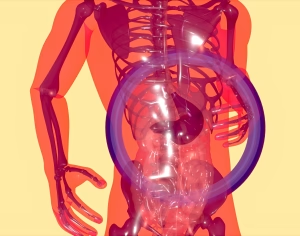
We have all experienced stomach pain. Either we ate something wrong, a medication we took had side effects, it might related to one’s menstrual cycle, and/or be simply chronic digestive issues that have some genetic component. How do we treat this with acupuncture and Chinese medicine?
First, per usual, we must identify the correct pattern.
If someone suffers from chronic constipation and bloating, we can assume the pattern is one of “food stagnation,” which can be corroborated by a dense sensation in the middle finger position of the right radial artery—also by palpating the epigastric region for tenderness. These patients tend to feel overheated, they might experience excessive thirst, insomnia, or irritability, all as a result of the intestinal inflammation. Whether or not there is distention alters the diagnosis.
We can needle points along the stomach and large intestine vessels to move gases out and downward. Depending on the rest of the pattern, we might also use the pancreas or even lung vessels to transfer mitochondria to the former organ vessels, the way one might money from their savings to their checking account, as needed. Herbal formulas indicated tend to revolve around rhubarb root, possibly lily-turf, gypsum stone, or white peony, the latter of which can be especially adept at treating all forms of cramping in the body.
From a western medical perspective, these are patients who might benefit from intermittent fasting and/or a magnesium supplement.
More commonly, stomach pain has to do with our blood. Either it is not moving or not arriving to the local area, leaving the smooth muscles of the organs dehydrated, sent into spasm in search of fluids, but we experience it as, Ouch. My tummy hurts.
In a pattern of “blood stagnation,” acupuncture works exceptionally well. We can use points along the pancreatic or liver vessels to encourage healthy blood movement. We might also use local points around the abdomen—where everyone always wants us to put it—to encourage local vasodilation and the dissolution of amenable masses. Useful herbal families might revolve again around white peony or rhubarb, but also apricot kernel, corydalis, or safflower. Generally, the veins beneath the patient’s tongue will be distended and purple enough to corroborate diagnosis.
Lastly, is blood deficiency, which might be slightly less amenable to acupuncture—more so to moxibustion, herbal medicine, the consumption of red meat, and healthy sleep hygiene. Moxibustion is often more effective at generating mitochondria and healthy fluids than acupuncture. Herbs we might consider are rehmannia, angelica, or even red dates, the latter of which has the added benefit to settle heart palpitations and anxiety.
Since 2 of the 3 physiological patterns for stomach pain pertain to the blood, it is quite common to be menstrual and/or hormonal related. Some patients for whom it is impractical to come every single week can benefit from coming at least just twice a month, the week before and after their cycle begins.



 The first and most obvious is to be charitable whenever possible. Be kind to others. This is easy on our good days when we feel good. Any jerk can do that. The challenge I pose to myself and others is to do so when we feel angry or wronged, exhausted or unwell. This doesn’t mean to not take care of oneself. It just means to still be kind when someone cuts you off on the road or wrongs you. My wife, for example, likes to give reckless drivers the benefit of the doubt: “Maybe he has diarrhea.” You can use that one. Then again, maybe she doesn’t have diarrhea. Maybe she’s just perpetually miserable and rushed, which one might argue is even worse than diarrhea!
The first and most obvious is to be charitable whenever possible. Be kind to others. This is easy on our good days when we feel good. Any jerk can do that. The challenge I pose to myself and others is to do so when we feel angry or wronged, exhausted or unwell. This doesn’t mean to not take care of oneself. It just means to still be kind when someone cuts you off on the road or wrongs you. My wife, for example, likes to give reckless drivers the benefit of the doubt: “Maybe he has diarrhea.” You can use that one. Then again, maybe she doesn’t have diarrhea. Maybe she’s just perpetually miserable and rushed, which one might argue is even worse than diarrhea! While many people are preoccupied with what foods are good for them, what foods are “bad,” and which exercise is ideal, from a Chinese medical perspective it is easier to simplify: The more we live according to the Dao (the scientific way of nature), the less ailments we will have. The less we live with the Dao, the more ailments we will have.
While many people are preoccupied with what foods are good for them, what foods are “bad,” and which exercise is ideal, from a Chinese medical perspective it is easier to simplify: The more we live according to the Dao (the scientific way of nature), the less ailments we will have. The less we live with the Dao, the more ailments we will have.